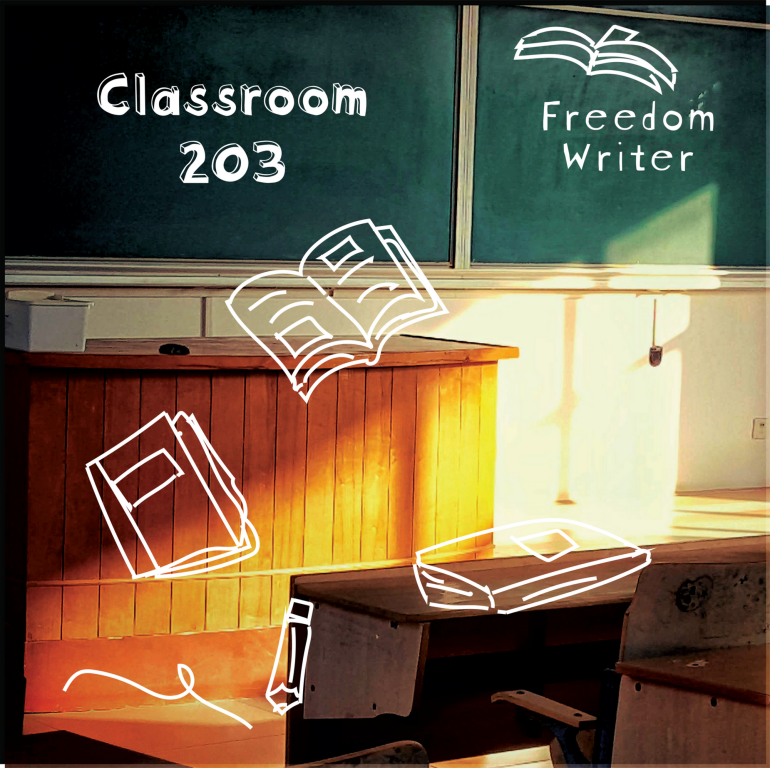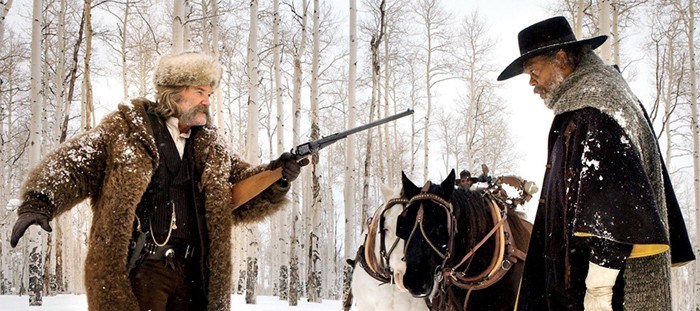“Nobody ever listens to a teenager. Everybody thinks you should be happy just because you’re young. They don’t see the wars that we fight every single day. And one day, my war will end. And I won’t die. And I will not tolerate abuse from anyone. I am strong.” Brandy holds her glass of sparkling cider up, smiling softly. She knows she’ll remember her friends and what they did here for a long, long time, and that this truly was the beginning of a new chapter in their lives.
“Freedom Writers” is a 2007 biographical drama film written and directed by Richard LaGravenese and is based on the 1999 book “The Freedom Writers Diary” by Erin Gruwell and the Freedom Writers. The film stars Hilary Swank (film), Patrick Dempsey (“Grey’s Anatomy”), Imelda Staunton (“Harry Potter”), and Scott Glenn (“The Hunt for Red October”), as well as an ensemble cast of students in Swank’s class, a group of diverse students from Long Beach, California that wrote about their lives and the struggles they went through during the time of the Rodney King riots. The Rodney King riots were a time of civil unrest during 1992 in Los Angeles when a jury acquitted four officers from the Los Angeles Police Department that were charged with using excessive force in the arrest and beating of Rodney King. The resulting six day riots caused damage to various parts of the city, but Koreatown in particular was damaged disproportionately.
The film follows Erin Gruwell (Swank) in 1992 as she begins her first year of teaching at Woodrow Wilson High School, a voluntary integrated school with tense relations between students since the LA riots. She meets her students in her classroom, Room 203, and they all dislike her upon their first few classes together. There is also tension between Gruwell and the school’s administration, Margaret Campbell (Staunton), who refuses to take the students seriously enough to give them proper books to educate them, and continuously does nothing to combat the racism in the school system, the faculty even perpetuating the school’s racism at several points. What starts out as a tense relationship gives way to openness and understanding as Gruwell has the students of her class begin writing every day in composition notebooks she gives them. As she spends more time with the students, they begin to open up to her and others about the trauma and pain they’ve been through coming from different backgrounds, and through their writing, begin to come together as a classroom and large group of friends.
One of the things I really liked about the film was the realism of the time period. This film doesn’t hold back in showing that these kids are going through real, brutal realities of their circumstances at such a young age, and the consequences of that are shown in the way their writing is full of painful truths and trauma, from being in refugee camps, to watching their parents face abuse, to one of their childhood friends being killed right in front of them. The students truly feel like they’re soldiers in an ongoing war with each other, and a thick, heavy air of tension can be felt in nearly every scene in the beginning.
There’s also great ways that the film plays with music and rhythm, the film utilizing cinematic beats in its editing and sound design outside of the soundtrack. Will.I.Am selected the songs for the film’s soundtrack, featuring tracks by Tupac, Slick Rick, and others that all lend the film a sense of 90’s hip hop musicality.
The film and the book deal with coming of age themes that are still relevant to young students to this day; self reflection, tolerance, overcoming differences, and trust. All of these elements come together to show the students beginning to take the first steps toward their new lives, climatically signified by a “Toast for Change” scene where Gruwell gives the students sparkling apple cider in plastic cups and has them toast to something in their lives they’re going to change.
As said earlier, this film is based on a book which is based on the true story of Erin and her class in Room 203. All of the students from the class graduated and went on to attend a city college or a university. More than half graduated with college degrees, and several went even farther, pursuing more advanced education after Gruwell’s class. The program even exists to this day, with a sequel, “Dear Freedom Writer: Stories of Hardship and Hope from the Next Generation” being released in March 2022.
However, one of the film’s criticisms is that Gruwell is painted as a white savior figure and that the film lingers too much on her life and not enough on the students’ lives. The film acknowledges this fact, with one of the first scenes of Gruwell with her students featuring them openly criticizing her for trying to act like a white savior, but the film then continues to plot wise feature Gruwell more than the students. While I’d not go so far as to discredit the mutual work put in by both Gruwell and the students to better their lives, I will say that I would’ve appreciated the film more if we got to explore the lives of the students more.
For example, one of the most interesting characters in the film is Eva Benitez, one of Gruwell’s students. Being hispanic in Long Beach, Eva had to face several people in her life gunned down, as well as deal with the constant threat of violence against her by the gang that her boyfriend is a part of. Her story arc through the film was something I found myself wanting more of, instead of several scenes where Patrick Dempsey mopes around the home he has with Gruwell and has a bad attitude toward her spending more time with the children she’s paid to pay attention to.
“Freedom Writers” does quite a lot to show the true story of the students of Gruwell’s original class, however it lacks a little bit of a deeper connection with some of the students’ home lives, their character arcs summed up neatly—much unlike how life unfolds rather messily—in a monologue superimposed over text from fictional journal pages. Still though, the story of Room 203 and Erin Gruwell is an inspiring story that is a reminder that the voices of young people all around the world matter and that we all have a story to tell, no matter if we think no one will want to hear it.
Freedom Writers is available for purchase or streaming on VOD.





